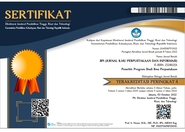MENTAL DISABILITY AND CRIMINAL JUSTICE IN INDONESIA: A LEGAL AND INFORMATIONAL LITERACY APPROACH BASED ON MAQASHID AL-SYARI’AH.
Abstract
Keywords
Full Text:
PDFReferences
Al-Khadimi, N. (2012). The importance of the maqasid al-shariah in Islamic law. Advances in Natural and Applied Sciences, 6(3), 823–830.
Arisakti, A. M. N., & Aisyah, S. (2021). Perbandingan delik pidana menurut aliran monistis, dualistis dan mazhab fikih. Shautuna, 2(2).
Ashar, D., et al. (2019). Panduan penanganan perkara penyandang disabilitas berhadapan dengan hukum. Depok: Masyarakat Pemantau Peradilan di Indonesia.
Asmawi, et al. (2022). The reformulation of Pancasila constitutional state: Maqāsid al-Syarīʿah's perspective. Madania, 26(1).
Bruce, C. (2003). Information literacy as a catalyst for educational change: A background paper. In White Paper prepared for UNESCO, the U.S. National Commission on Libraries and Information Science, and the National Forum on Information Literacy. Prague, Czech Republic.
Dalimunthe, M. A., Syam, A. M., Suhendar, A., & Al-Mujtahid, N. M. (2024). Deconstructing Islamic cyberculture: Mitigating inferiority and cancel culture in virtual space. OPINI: Journal of Communication and Social Science, 1(2), 12–26.
Dalimunthe, M. A., Syam, A. M., Suhendar, A., & Ritonga, A. R. (2024). Optimizing local regulations in creating a balance of human health and environmental preservation. KOLABORASI: Journal of Multidisciplinary, 1(1), 1–12.
Fauzan, I., Arifin, A., Dalimunthe, M. A., & Rahmadani, S. (2023). The configuration of ethnic and religious relations towards the 2024 general election: A case study in Medan, Indonesia. Multidisciplinary Science Journal, 6(2), 2024006. https://doi.org/10.31893/multiscience.2024006
Handayani, N. H., et al. (2020). Access to justice for persons with disabilities in Indonesia. International Labour
Hart, H. L. A. (1968). Punishment and responsibility: Essays in the philosophy of law. Oxford University Press.
Humaizi, Hasan, N. N. N., Dalimunthe, M. A., & Ramadhani, E. (2024). Harmony in virtual space: Forum Kerukunan Umat Beragama (FKUB) development communication in creating digital literacy based on religious moderation. Journal of Infrastructure, Policy and Development, 8(7), 4299. https://doi.org/10.24294/jipd.v8i7.4299
Ibrahim, J. (2005). Teori dan metode penelitian hukum normatif. Malang: Bayumedia.
Indainanto, Y. I., Dalimunthe, M. A., Sazali, H., Rubino, & Kholil, S. (2023). Islamic communication in voicing religious moderation as an effort to prevent conflicts of differences in beliefs. Pharos Journal of Theology, 104(4). https://doi.org/10.46222/pharosjot.104.415
Kholil, S., Ismail, I., Dalimunthe, M. A., Suhendar, A., & Rambe, R. F. A. K. (2024). Strengthening religious moderation through PTKIN and SIT collaboration to build social harmony. JIPI (Jurnal Ilmu Perpustakaan dan Informasi), 9(2), 228–236.
Lloyd, A. (2007). Recasting information literacy as sociocultural practice: Implications for library and information science researchers. Information Research, 12(4).
Morse, S. J. (2011). Mental disorder and criminal law. University of Pennsylvania Law School Faculty Scholarship. https://scholarship.law.upenn.edu/faculty_scholarship/364/
Muhaimin. (2020). Metode penelitian hukum. Mataram: Mataram University Press.
Prodjodikoro, W. (2003). Asas-asas hukum pidana di Indonesia. Bandung: Refika Aditama.
Rambe, R. F. A. K., Ritonga, A. R., & Dalimunthe, M. A. (2023). Komunikasi publik pemerintah Kota Medan dalam pengalihan kewenangan kebijakan terkait UU No. 23 tahun 2014. KomunikA, 19(01), 39–44. https://doi.org/10.32734/komunika.v19i01.11411
Simon, R. J., & Ahn-Redding, H. (2006). The insanity defense the world over. Lexington Books.
Sikumbang, A. T., Dalimunthe, M. A., Kholil, S., & Nasution, N. F. (2024). Digital da'wah Indonesia ulema in the discourse of theology. Pharos Journal of Theology, 105(1), 1–14. https://doi.org/10.46222/pharosjot.1051
Syam, A. M., Dalimunthe, M. A., Suhendar, A., & Rambe, R. F. A. K. (2024). Islamic philosophy: A comparative perspective between Ibnu Khaldun and Karl Marx. SYAHADAT: Journal of Islamic Studies, 1(2), 55–72.
Tongat. (2008). Dasar-dasar hukum pidana Indonesia dalam perspektif pembaharuan. Malang: UMM Press.
Utami, et al. (2025). Analisis pertanggungjawaban pidana dan perlindungan hukum terhadap penyandang disabilitas di Indonesia. Causa, 11(1).
Wahyuni, F. (2017). Dasar-dasar hukum pidana di Indonesia. Jakarta: PT Nusantara Persada Utama.
Wati, N. A., & Faisol, S. A. (2024). Pertanggungjawaban pidana bagi terdakwa pengidap gangguan mental organik. Law, Development & Justice Review, 7(3).
Widodo, S. E., & Kamilah, A. G. (2015). Aspek-aspek criminal justice bagi penyandang disabilitas. Jakarta: Institute for Criminal Justice Reform.
DOI: http://dx.doi.org/10.30829/jipi.v10i1.24167
Refbacks
- There are currently no refbacks.
Copyright (c) 2025 Jumanah Nasution, Muhammad Syukri Albani Nasution, Ramadhan Syahmedi Siregar

This work is licensed under a Creative Commons Attribution-ShareAlike 4.0 International License.










_1.png)
.png)
_.png)

